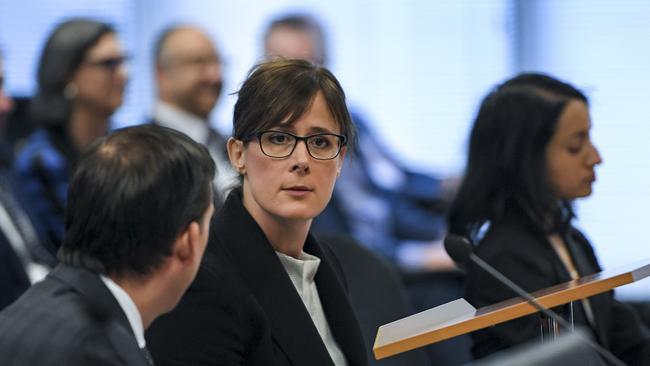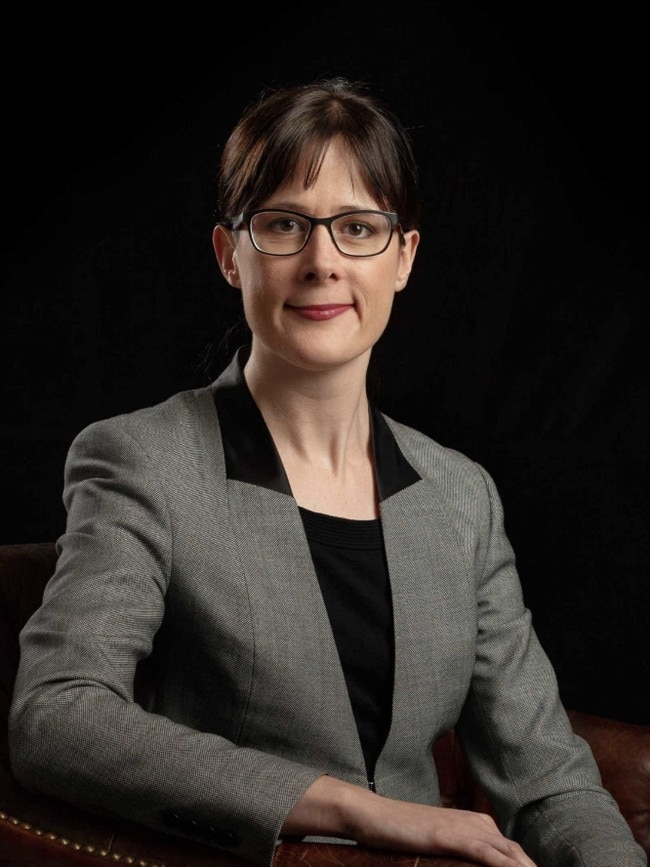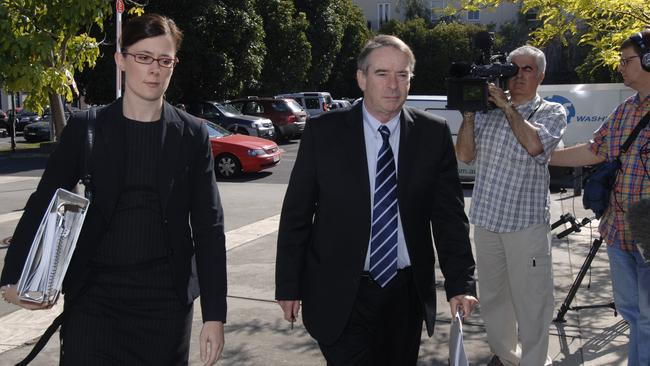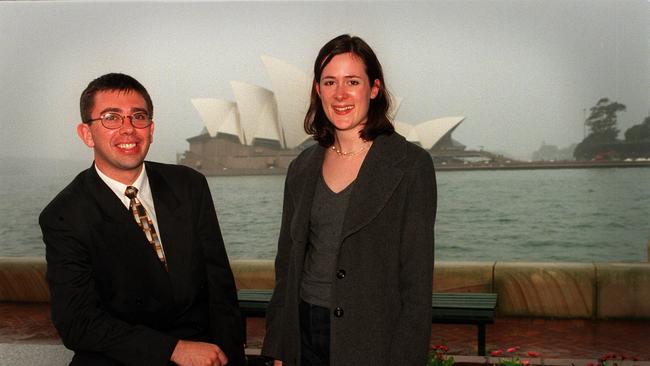Legal eagle soars over royal commissions
Rowena Orr went from obscurity to corporate giant killer almost overnight. But a close look at her record reveals drama has never been far away.

Rowena Orr’s last case before the banking royal commission that made her a star ended in failure.
In January, Orr was part of a team representing Iranian-born woman Negar Ghodskani, who was resisting extradition to the US on charges of busting sanctions against her homeland.
It was always going to be a difficult case to win, despite Ghodskani’s distressing circumstances — she was locked up in an Adelaide jail, separated from her newborn child.
But 11 months later, as Kenneth Hayne’s financial services royal commission prepares to put the chief executives of Australia’s big banks into the witness stand for one last round of hearings, it seems Orr can do no wrong.
She may lack the rhetorical flourishes of the older men who dominate the ranks of Australia’s leading barristers; the closest she comes to a catchcry is “let me show you a document”.
This is a phrase she uses just before taking the hapless bank executive she has trapped in the stand to prove that what they’ve been saying for the past half an hour is completely untrue.
Lawyers also tell The Weekend Australian Orr’s ready access to the royal commission’s thousands of documents means its interrogations are a bit like shooting fish in a barrel.
But lawyerly quibbles aside, her calm intensity in cross-examination has earned her fans in executive offices across corporate Australia, or at least in those parts of it not likely to have to face her withering questioning.
“She’s a reluctant rock star,” says one senior barrister.
“She’s like a meteor crossing the sky.”
While meteors fall to earth, legal observers think Orr can rise higher still.
The betting is that she’ll end up a judge on either the Victorian Supreme Court or Federal Court benches.
“There’s no doubt about that,” says barrister Frank O’Loughlin, who shared chambers with Orr for a few months in the early 2000s.
At the time, O’Loughlin was reader — “a barrister with training wheels” — to Michelle Gordon, who is now a High Court judge.
Gordon in turn read with Geoffrey Nettle, also now on the High Court, who in turn read with Hayne, who, completing the circle, is married to Gordon.
“There’s Supreme Court and High Court judges going back for decades in that chain,” O’Loughlin says.
“Rowena will end up being a judge too.”

All over the facts
The near-destruction of venerable financial services group AMP; a witness who collapsed in the stand; tales of crimes committed by greedy bankers and never punished by lax regulators — these are the things that have catapulted Orr and her fellow counsel assisting into the spotlight and earned her the nickname “Shock and Orr”.
But while it may seem like she came from nowhere, a closer look at her track record reveals she has been involved with some of Victoria’s toughest legal episodes.
From the death of toddler Jaidyn Leskie — a still-unpunished murder that gripped the state, on-and-off, for a decade — through to police union boss Paul Mullett’s ill-fated bid to sue former chief cop Christine Nixon for malicious prosecution, when there has been controversy Orr has often been involved.
It is not even her first royal commission: she was senior counsel assisting the state at the Victorian inquiry into family violence set up two years ago by the Andrews government.
“She was very reasonable and very sensible,” a source close to the family violence royal commission said.
Adding to her experience at fact-finding exercises, Orr also appeared at two inquiries held by Victoria’s Independent Broad-based Anti-corruption Commission.
Hers is also a biography that shows how small the world can be at the top end of the legal profession.
Orr, who declined to be interviewed, was born in Sydney in 1973 and went to university in Queensland, where she studied law and economics.
In the mid to late 1990s she did her legal apprenticeship as a judge’s associate — first to High Court judge Michael McHugh, and then to the chief justice of Queensland, John Macrossan.
McHugh, who sources say “thinks very highly” of Orr, served on the High Court bench alongside Hayne.
“She would have crossed paths with Ken Hayne at that time,” O’Loughlin says.
“Ken would have formed a view about her capabilities.”
After a stint as a solicitor for the Commonwealth Director of Public Prosecutions, she went to St John’s College, Cambridge, to study criminology.
When she received her master’s degree in 2000, she donated two books to the St John’s library, including one titled Preventing crime and disorder: targeting strategies and responsibilities.
The book is about the best ways to deal with potential offenders, concentrating on young people and troubled housing estates.
These days Orr deals with offenders who wear pinstripes, not tracksuits, but her next big job involved one of the most depressed parts of Victoria, Moe, in the Latrobe Valley: an inquiry into the death of one-year-old Jaidyn Leskie, who was abducted and murdered in 1997.
The toddler’s babysitter, Greg Domaszewicz, was charged with murder but found not guilty in 1998.
In 2003, with community disquiet still high over the unsolved case, then-coroner Graeme Johnstone opened an inquest, roping in former Victorian Labor Attorney-General Jim Kennan, SC, as counsel assisting and Orr as his junior.

It was in this volatile crucible that Orr showed much of the steel and determination that would, 15 years later, earn her the admiration of onlookers to the banking royal commission.
Hearings were torrid, punctuated by frequent stoushes with media organisations over what could be published, and ended up stretching on for three years after Domaszewicz’s counsel, Colin Lovitt, QC, forced it to be restarted after convincing the Supreme Court to quash it on technical legal grounds.
Orr shouldered much of the work, examining 17 witnesses — from an illiterate murderer who said Domaszewicz confessed to him in jail, through to members of Leskie’s family to police, prison officials and forensic scientists.
In the transcript, her calm demeanour and precise, polite questioning contrasts with the outbursts of Domaszewicz’s counsel, Colin Lovitt, QC, who repeatedly railed against police leaks to the Herald Sun newspaper and attacked Kennan and Orr’s conduct of the inquest.
Lovitt’s advocacy, which he was doing for free, was so passionate that late in the hearings it earned him a rebuke from Johnstone, who said he behaved inappropriately the previous day by being “rude” to him and counsel assisting.
On one day in November 2003, while Orr was examining the murderer, Lovitt slammed counsel assisting for asking detailed questions that covered material in his statement, saying that “they now want to dance all over the material” after conferencing with the witness, whose identity is suppressed.
“I don’t know that is correct, your worship,” Orr responded.
“There has been no conference between counsel assisting and (the witness).”
Lovitt attacked her again the following day, when Orr was running the inquiry on her own.
“They have an overall role rather than to be simply representing the Homicide Squad.”
“I’m not representing the Homicide Squad, your worship,” Orr said.
While theatrics may have been absent, what would later become Orr’s trademark statement did make an early appearance: “Could I show you this document?” Orr asked one homicide detective.

Eventually, in October 2006, Johnstone found Leskie’s death occurred “by accident, by omission or otherwise” while Domaszewicz was babysitting him.
Over the next few years, Orr built up a practice heavy on administrative law, often representing Victoria Police.
But she’s also been an all-rounder, representing the state in constitutional cases and working on both sides in criminal law.
In 2015 — after she had become a QC — she even took a trip down to Victoria’s lowest court, the Magistrates, alongside Neil Clelland, QC, to successfully defend young artist Paul Yore against child pornography charges over an exhibition containing collages in which child faces were pasted on adult bodies.
Artists should be “encouraged by the magistrate’s acceptance that the right of freedom of expression is relevant to the interpretation of statutory definitions underpinning criminal offences such as those involving child pornography,” Orr said in a case note for the Arts Law Centre.
In recent years, Orr has taken on more work in competition law, working for or against the Australian Competition and Consumer Commission.
A senior legal source said she deserved much of the credit for a hard-fought victory in a case attacking vacuum cleaner company Lux over door-to-door salesmen who preyed on old ladies.
The ACCC was thrashed at trial in 2013, with Federal Court judge Christopher Jessup throwing out every one of the five case studies the regulator put before him.
On appeal, Orr was junior to Justin Gleeson, SC, who went on to be solicitor-general.
“He relied on her because she had the facts,” the source said.
“At all times Rowena was calm — Justin was very demanding.”
The ACCC won.
She was made Queen’s Counsel in 2014, one of just four women out of 22 silks announced in Victoria that year.
Orr also appeared with Neil Young, QC — who appeared for NAB this year at the banking royal commission — against the ACCC at a Competition Tribunal hearing in which a company called Sea Swift was seeking authorisation to take over freight shipping routes in Australia’s far north.
“She was absolutely fantastic in cross examination, command of material,” the source said.
“I just thought, ‘wow’. They were better off with her because she was so on top of the facts.”
And in the end, it was facts that won the day for the company: the tribunal’s “factual findings fatally undermine much of the ACCC’s theory of harm”, the tribunal said in 2016.
“Theory must give way to fact.”
Profile on the rise
Orr lives with her partner, Ben Ihle, who is also a barrister, and their two school-age children in the inner-northern Melbourne suburb of Clifton Hill. Ihle, who declined to comment, is himself no stranger to headline-grabbing cases. A sports law specialists, he represented players from AFL club Essendon in a challenge to doping bans heard by the Swiss-based Court of Arbitration for Sport. (They lost.)
From the front, it looks like a simple double-fronted Federation-era weatherboard, but it is probably no surprise that there is a lot more going on out the back, where it opens out into a big open-space living era.
As if running a royal commission and sports law practice wasn’t enough, neighbours say the couple are now renovating the house.
There are concerns at the bar that the extraordinary work rate of Hayne’s young team of counsel and the 25 or so solicitors on secondment from the Australian Government Solicitor who back them up is physically dangerous.
For the past 11 months, the team has dealt with banking executives who have lied, prevaricated, and collapsed in the stand; some of Australia’s grandest institutions, which have alternately starved them of information and flooded them with thousands of last-minute documents; and a steady flow of finance sector customers who have flooded the hearing room with emotion while explaining how the banks made them into victims.
But the end is now in sight. On Monday in Sydney, executives from Commonwealth Bank are expected to slide into the commission hot seat, kicking off the inquiry’s last fortnight of hearings.
After that, Hayne has until February 1 to produce the final report of an inquiry that has already shaken the foundations of one of Australia’s richest industries.
With her profile sky-high, opportunities will abound for Orr, who will turn 46 at the end of May.
“She’s very smart, she’s very diligent, she’s very hardworking,” says leading commercial silk Norman O’Bryan, who has worked with Orr.
“She’s terrific as a barrister.
“She was a really good choice for that job because she doesn’t grandstand, she just gets out there and nails them. It’s the job of a lifetime — she’s got all these fish in a barrel and she shoots them with a bazooka.”
Another senior legal source has nothing but praise for Orr, lauding her as a clear, strategic thinker.
“I would trust her with a lot of matters and I think the experience she’s had in the royal commission will serve her well — assuming she doesn’t get snapped up in five minutes and become a judge.”


